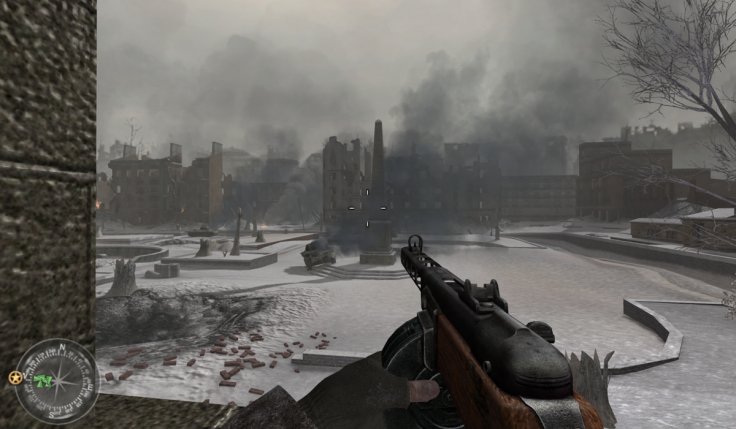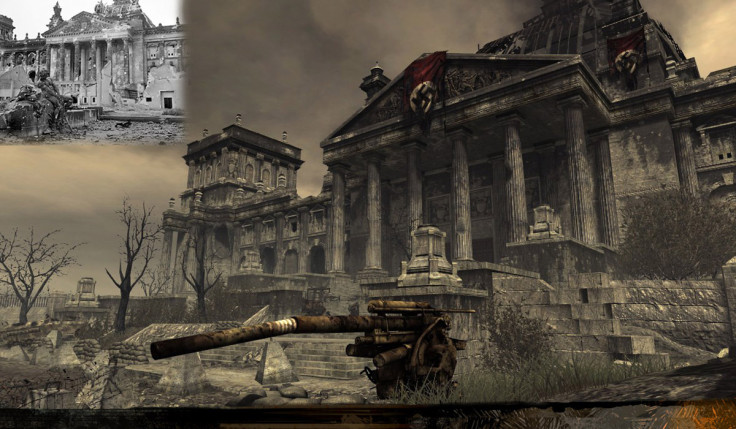Call of Duty and Battlefield need a World War 2 resurgence

Despite consistently, impressively, pushing the boundaries of what's technically possible on today's hardware, those making first-person shooters (FPS) games with a military theme have given up on writing.
Battlefield Hardline and Call of Duty: Advanced Warfare are wholly divorced from war and its real life implications. They're heightened fantasy, and as much as we might like to give the benefit of the doubt - to argue that leaving war behind to plunder cop dramas or futurism for inspiration is a way to liberate these military shooters from boring, gameplay-restricting reality - it seems more to me that Hardline and Advanced Warfare are products of exasperation.
The modern setting that shooters so hungrily rushed into around 2007 brought with it a lot more pressures, a lot more responsibility, when it came to narrative. World War 2, at least in the sense of popular mythology, was a clear story of good versus evil, complete with dozens of battles and events to re-appropriate into spectacle.
The Iraq and Afghanistan wars, however – the modern wars – were nowhere near as defined. More than twelve years after the bombing of al-Dora, the questions which surrounded the Allied invasion of Iraq still remain: why were we there? Who were we fighting? What did we hope to achieve? And faced with these murky politics, these ill-elucidated lines between goodies and baddies, the makers of modern war shooters have given up trying to say something.
And so we have Advanced Warfare, Hardline and, later this year, Black Ops 3 – military shooters only in the superficial sense, war games which have withdrawn their stake in war, and masqueraded that defeat as a concerted effort towards making games "fun" again. If ever there was a time for World War 2 shooters to have a resurgence, this is it.
When it comes to the problems currently inherent to shooting game storytelling, the Second World War is not a silver bullet. On the contrary, WW2 brings with it a set of fresh, arguably more intimidating problems.
How do you deal with something so reprehensible as Nazism in a video game? How do you make a tragedy like Stalingrad, or Market Garden, into something people want to enjoy playing? Medal of Honor and the earlier Call of Duty games laid a path, and with a great deal of research and care, the writers and designers managed to subtly imply the horror of WW2 whilst providing entertainment. But their efforts were not complete – those games were mixed results.
So simply building a typical shooter around WW2 and hoping that by proxy, just because it's Allies versus Axis, a more substantial plot will bleed through, won't work. A move away from fantasy, futurism and modernity – or at least, the hysterical kind of modernity which was until recently in vogue – will take more than simply re-skinning Delta Force into 101st Airborne.
I can understand why game-makers and especially publishers might be reticent to start shooters over, but surely the problem of how to balance historical responsibility and players' willingness to engage is more interesting to solve than which monument to next blow up.
Surely developers want something better to do than designing this year's multiplayer perks. And surely someone has noticed the sales of Call of Duty slowly dropping off, and is eager to be the first label to publish something different. WW2 would be work, and I'm resistant to the idea that it would spontaneously re-invent shooters, because that implies a lack of care towards the subject matter. But it'd an interesting problem to solve. It'd be a challenge, and I suspect game-makers enjoy those.

A good World War 2 game, one made with care and attention, could bring with it a lot of qualities that are absent from current shooters. Melancholia, but not forced. Violence, but not gratuitous. Factual basis, but not exploited.
Of course it's possible to create these things outside of WW2 shooter, and it's equally possible that a WW2 shooter might end up just as gross, vacuous and ugly as the latest Call of Duty. But I'd like to believe the aesthetic, the period, the history, bring with them a certain amount of gravitas.
I'd like to think that with simpler moral lines drawn, writers would be able to drill down into more interesting and nuanced facets, to find a meaningful story rather than dream up one that means nothing.
And to top it off, I think we're all bored. I think we're bored of future and lasers and jet-packs. Above all else, I think a WW2 shooter would sell.
So aside from approaching them with the same cavalier, spectacle-first attitude that seems to have led shooter design over the past eight years, I don't see why World War shooters shouldn't make a comeback. People would buy them. And they'd give game-makers what they deserve - something better to do.
For all the latest video game news follow us on Twitter @IBTGamesUK.
© Copyright IBTimes 2025. All rights reserved.






















